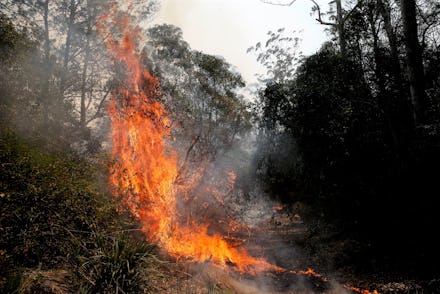Yes, climate change made Australia’s bushfires worse

It is difficult to attribute any singular weather event to climate change, and the recent, rampant bushfires burning across Australia are no exception. Scientists would not attribute to the event in its entirety to climate change, but it is undeniable that conditions related to the warming of the planet exacerbated the situation. New research published this week by World Weather Attribution looked into just how big of a role climate change played in worsening the situation in Australia and found that while bushfires do occur naturally, the flames were made significantly worse by warmer global temperatures.
Researchers at World Weather Attribution — which works with a number of partners including National Center for Atmospheric Research (NCAR) and Red Cross Red Crescent Climate Centre — used 11 climate models dating as far back as the 1850s to determine how greenhouse gas emissions have affected the weather conditions experienced by Australia over the last two centuries. The models showed how different emissions levels result in different levels of extreme heat and fire risks across the massive nation. The findings suggest that climate change increased the likelihood of devastating fires, not necessarily causing them but certainly making the situation worse.
The study attributed the extreme heat being experienced by Australia to climate change — the rising global temperature putting the country at twice the level of risk that it would otherwise experience. As for the risk of fire, that has been raised by as much as 30 percent as a result of climate change-related conditions — though researchers have suggested that the situation may actually be worse than the simulations show. They noted within their findings that "the true chance in probability is likely much higher” because climate models often tend to overestimate natural climate patterns, which can obscure the true impact of climate change.
It's worth noting, as the researchers did, that it is natural for Australia to have a fire season and to experience heat waves. However, the ones that the country experienced over the last few years were considerably more drastic and damaging than they have been previously. The country saw record levels of heat over the course of its summer months and experienced unprecedented levels of drought that pushed many communities close to Day Zero — the point when water sources entirely run dry. Climate change and its effects operate as a system — each condition interacts with one another to produce a sort of cascading result. In the case of Australia, the hotter, dryer than usual season exposed the country to conditions that result in more fire risks, which led to flames that got out of control.
Unfortunately, it seems our future will only bring us more of these incredibly challenging conditions that produce a confluence of events that many regions simply aren't equipped to sufficiently respond to. Scientists at World Weather Attribution warned that if we achieve the goals of the Paris Climate Agreement and keep global temperature rises under two degrees Celsius (3.6 degrees Fahrenheit), it would still result in considerably higher risks of bushfires in Australia. The country would be four times more likely to experience a fire season like the incredibly destructive one that it just went through than it currently is. Given the amount of devastation Australia experienced this year — more than one billion animals were killed, large portions of the country's wildlife was destroyed, 34 people were killed, and 46 million acres of land was scorched — it is possible that the exponential effects of more fires like this could be next to impossible to fully recover from.
It is impossible to ignore that climate change is making extreme weather events worse. Environment-focused publication Carbon Brief reported in 2019 that 68 percent of more than 230 extreme weather events were made more severe by human-caused climate change. A similar result presented itself in Australia, and it is likely that we will continue to see these events made considerably worse by a warming planet. Climate change may not be the tinder that starts the fire, but it certainly seems to be acting as gasoline. It's our responsibility to collectively find the hose before things get even more out of control.